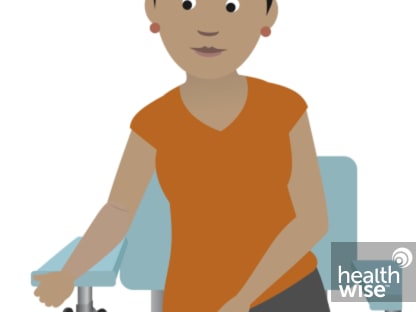First-Trimester Screening for Birth Defects
During the first trimester of pregnancy, screening tests for birth defects and genetic conditions may be done. These tests look for possible problems with your baby. The tests may be called first-trimester screening, combined first-trimester screening, or the combined screening.
The screening tests show the chance of your baby having certain birth defects or genetic conditions, such as Down syndrome or trisomy 18. But these tests can't tell you for sure that your baby has a problem.
First-trimester screening tests include:
- Blood tests. These measure the level of two substances in the blood called pregnancy-associated plasma protein A (PAPP-A) and beta-human chorionic gonadotropin hormone (beta-hCG). PAPP-A is a protein in the blood. Beta-hCG is a hormone made by the placenta.
- Nuchal translucency test. This test uses ultrasound to measure the thickness of the skin at the back of your baby's neck. An increase in the thickness can be an early sign of certain genetic conditions, such as Down syndrome.
In some cases, your doctor or midwife looks at the combined screenings that you've had over a period of time. This is called an integrated screening. It's done in two stages at two different times during the pregnancy.
How It Is Done
Screening tests for birth defects and genetic conditions done in the first trimester of pregnancy can be done using a sample of your blood and using ultrasound to measure the thickness of the skin at the back of your baby's neck.
Blood tests
A health professional uses a needle to take a blood sample, usually from the arm.
Nuchal translucency ultrasound test
A small, handheld device is moved over your belly to display images of the baby. The thickness of the fluid buildup at the back of the baby's neck is measured.
Watch
Results
First-trimester screening shows the chance of your baby having certain birth defects or genetic conditions, such as Down syndrome or trisomy 18.
Your doctor or midwife may tell you the result of your test as a set of numbers.
- A positive result means that there is a higher-than-average chance that your baby has Down syndrome or trisomy 18. Doctors and midwives often use a certain number as a cutoff for a positive result. For example, they may say the cutoff is 1 out of 200. This means that if your result is 1 out of 200 or 1 out of a number less than 200 (such as 1 out of 100), you have a positive result. This means that your baby has a higher chance of a birth defect or a genetic condition.
- A negative result means that your baby probably doesn't have those birth defects or genetic conditions. If your result is 1 out of 300, this means that you have a negative result and your baby has a lower chance of these problems. But it doesn't guarantee that you will have a normal pregnancy or a healthy baby.
If you have a positive test result, your doctor or midwife may give you the option to have chorionic villus sampling (CVS) or an amniocentesis test in the second trimester to find out if your baby has a problem. But it's your choice whether to have another test.
If you have a negative result, you may choose not to have any more tests.
Accuracy of the test
First-trimester screening (nuchal translucency combined with blood tests) correctly finds Down syndrome in 82 to 87 out of 100 fetuses who have it. This also means that these tests miss it in 13 to 18 out of 100 fetuses.
It's possible that a screening test will be positive—meaning the test result is abnormal—but the baby doesn't have the problem. This is called a false-positive test result. And it's also possible that a screening may show that a baby doesn't have a birth defect or genetic condition when they do have it. This is called a false-negative test result.
A false-positive result can cause stress and lead to testing you don't need (such as chorionic villus sampling [CVS]). In many cases, those with a positive screening test result are actually carrying a healthy baby.
Related Information
Credits
Current as of: July 15, 2025
Author: Ignite Healthwise, LLC Staff
Clinical Review Board
All Ignite Healthwise, LLC education is reviewed by a team that includes physicians, nurses, advanced practitioners, registered dieticians, and other healthcare professionals.
Current as of: July 15, 2025
Author: Ignite Healthwise, LLC Staff
Clinical Review Board
All Ignite Healthwise, LLC education is reviewed by a team that includes physicians, nurses, advanced practitioners, registered dieticians, and other healthcare professionals.



